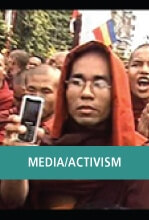
https://www.filmplatform.net/product/mediaactivism
Can a documentary acutely affect the reality which it documents? What impact is carried by the act of recording? This collection brings together films which document the courageous work of those who use the camera/pen as a weapon. What are the stakes today of documenting and reporting while facing censorship, violence, and injustice? Can documenting make a difference?
New Currents Collections
Especially curated by Film Platform, aim to explore new directions and developments in documentary craftsmanship. They are organized according to major aesthetic trends and fields of influence which permeate documentary filmmaking today.